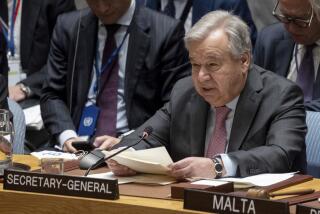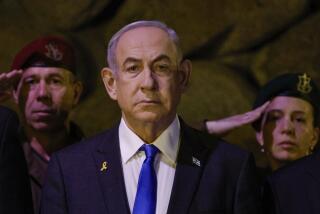Security Council OKs Yugoslav War Crimes Tribunal : Justice: Action is reminiscent of Nuremberg trials. But Bosnian ambassador warns it won’t deter criminals.
- Share via
WASHINGTON — Reflecting worldwide condemnations of “ethnic cleansing” and other atrocities in the Yugoslav civil war, the U.N. Security Council voted unanimously Monday to establish an international tribunal to punish all those guilty of war crimes in the region.
The action carried all the aura of the memory of the dramatic trials of Nazi war criminals in Nuremberg after World War II.
“There is an echo in this chamber today,” American Ambassador Madeleine Albright said. “The Nuremberg principles have been reaffirmed. . . . The lesson that we are all accountable to international law may have finally taken hold in our collective memory.”
But Muhamed Sacirbey, the Bosnian ambassador to the United Nations, was far less impressed. “We should not kid ourselves that war criminals are going to be deterred by just the establishment of a tribunal,” he told reporters.
Details about the implementation of the resolution and the practical workings of the tribunal were cloaked in obscurity.
In fact, the Security Council left it up to Secretary General Boutros Boutros-Ghali to come up with a plan. The resolution asked him to submit a report within 60 days that would include “specific proposals and where appropriate options for the effective and expeditious implementation of the decision” to establish the tribunal.
But, no matter what plan Boutros-Ghali comes up with, the United Nations would have to face the reality that some of those accused of war crimes are the same leaders that it is trying to pressure into accepting the peace plan developed by former Secretary of State Cyrus R. Vance and former British Foreign Secretary Lord Owen.
The State Department, for example, has castigated both Serbian President Slobodan Milosevic and Bosnian Serb leader Radovan Karadzic as potential war criminals.
To complicate matters further, the United Nations, unlike the victorious Allies in World War II, is unlikely to have the power or authority to march into the Balkans and arrest political and military leaders for war crimes.
Albright insisted that the peace negotiations would not hinder the hunt for war criminals. “These are two different actions,” she told reporters. “We feel very strongly that allegations of war crimes have to be followed up. We also feel very strongly that there have to be diplomatic efforts to bring the parties to the table.”
Vance and Owen, in fact, proposed the creation of an international war crimes tribunal as an element in their peace plan.
In its resolution, the Security Council made the case that the atrocities within the area of the former Yugoslav federation constitute “a threat to international peace and security” and that the United Nations therefore has the right to concern itself with the issue.
This rationale has been used by the United Nations before as justification for its intervention in Iraq and Somalia and represents further strengthening of the argument that it has the right to concern itself with violations of human rights throughout the world.
Citing numerous official reports, including a chilling study by the European Community that described mass rapes of Muslim women, the resolution said the Security Council felt “grave alarm at continuing reports of widespread violations of international humanitarian law occurring within the territory of the former Yugoslavia, including reports of mass killings and the continuance of the practice of ‘ethnic cleansing,’ ” the largely Serbian practice of forcing non-Serbs from Serb-controlled areas.
Although reports have accused all sides of violations of international law, they have condemned the Serbs most of all.
“We believe that the Serbs have been most culpable in these hideous practices,” said Thomas Richardson, the deputy British ambassador. “But we also believe that all such actions must be condemned.”
France introduced the resolution in the Security Council. French Ambassador Jean-Bernard Merimee said that, because of the reports from the Balkans, “the collective memory of our peoples had to relive the horror of a time of horrors we had thought to be a thing of the past.”
The United Nations has been engaged for several months in the collection of evidence of war crimes. Former Polish Prime Minister Tadeusz Mazowiecki has issued several reports as a special representative of the U.N. Human Rights Commission. The United Nations also set up a five-member War Crimes Commission that has received an enormous load of accusatory information from various governments and private organizations.
More to Read
Sign up for Essential California
The most important California stories and recommendations in your inbox every morning.
You may occasionally receive promotional content from the Los Angeles Times.












